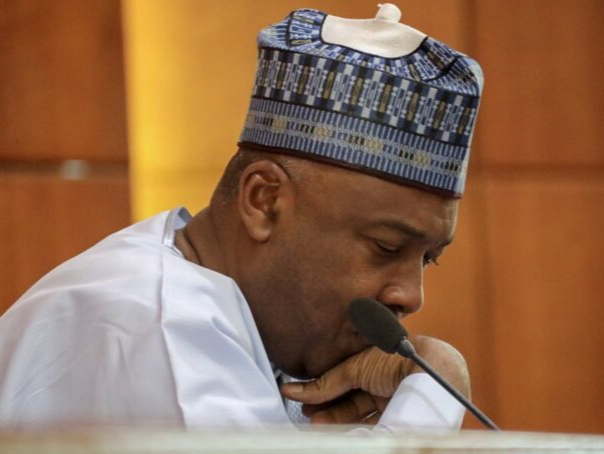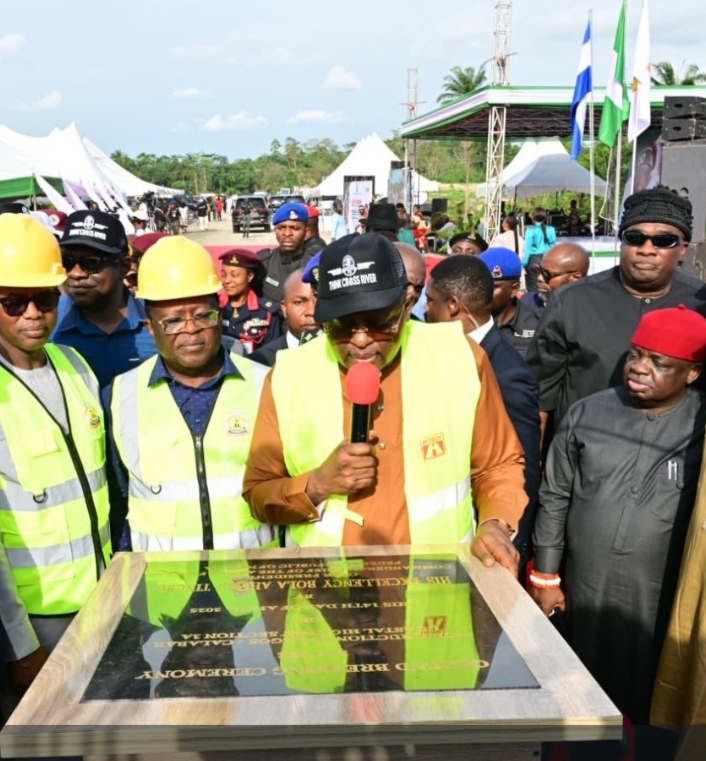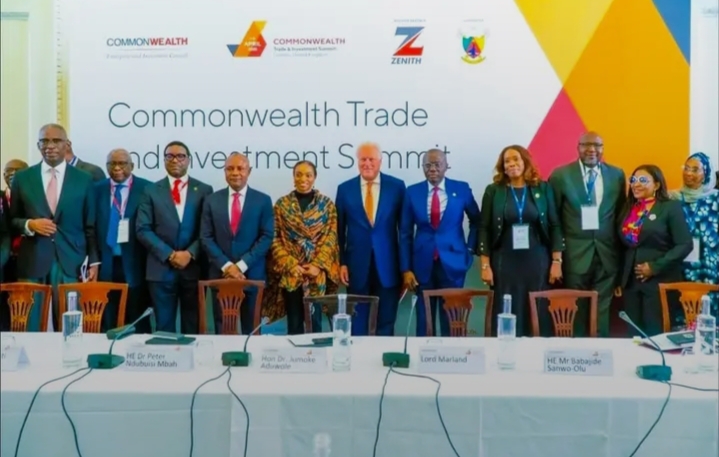By Iwara U. Iwara

While reports have certainly been in the press about the internecine conflict in parts of Abi Local Government Area, Cross River State, there always will be that invisible personal urge to get ‘in there’ and see things for yourself. Propelled by this urge, I made careful contacts some weeks ago about getting ‘in there’ to see things for myself, mentally take in everything and then document in ink, what I saw, even how I felt. When the opportunity finally came, I stealthily took it with both hands and to Usumutong I went.
My team…!
I owe them a lot and have decided to introduce you to a small competent team that made sure I got into and spent useful time in conflict-pressured Usumutong, Abi LGA.
William, my man on the ground went to great length putting together an elastic contact and travel plan to one part of what painfully has been referred to as Cross River’s “theatre of war”. At 12:45 pm, on this fateful Sunday, the three bikes William had arranged for our journey arrived differently, but for the same purpose. William, the friendly bow-legged fellow, packs massive ‘bush’ security experience. He can smell trouble from afar and has the cunning capacity to outwit you within a twinkle of an eye; he rode the first bike.
Utre, who rode the second bike is a mature less than five feet in height chap. For all the height he cannot boast of, he however can boast of a keen sixth sense, a more than warm disposition and a heart of steel. While his toes barely touch the ground when he mounts his bike, I still chose to ride with him because he is very careful on two wheels.
Hercules, who rode the third bike is young, powerfully built and makes hasty but tolerable decisions. His strength is his greatest asset and William confided in me that he picked him to be part of our team because of his strength and reliability.
Felix, the forth volunteer is a blood relation who missed the opportunity of being a world class goalkeeper. He is also powerfully built, has temper controlling inabilities but can be very reliable if the right chord is struck with him. He came along because of his network of contacts.
So…!
We departed Ugep, Yakurr Local Government Area, CRS, to Usumutong, Abi LGA, through that inauspicious dirt road, by the left, opposite the police station in Ugep. The sweltering heat, the audacious dust and the excellent bad road, confirmed instantly to me that this was an expedition. 20 minutes after we left Ugep, we arrived at the first check point, manned by young, friendly but security alert persons. I alighted from the bike and exchanged pleasantries with them. I was then invited into their makeshift hut and offered a drink.

The drink, in an Aromatic Schnapps bottle, came as a concoction of some sort. Inside the bottle were roots, leaves and several other objects that I struggled to identify. A red, one-yard cloth was tied round the bottle. Before they handed me a shot of what was inside, the bottle was taken outside, to a stone that had a half broken calabash, palm fronds, one or two other items and a bottle of what I still cannot tell. I suppressed multiple heart beats, took a gulp of whatever they offered and waited for the worst. Streaks of sweat were all I got without any explanations for why whatever was offered me. We were ordered on and I was quite relaxed that we effortlessly crossed this first hurdle.
We were disarmed at the next check point, 10 minutes before we entered Usumutong; this action was precautionary. As our bikes roared into the place, they were a mixture of stares. On some faces were stares of suspicion, on others, stares of curiosity but I still saw stares that recognised the squad that travelled with me and it was comforting. “Otonikan Bahumono” (The Light of Bahumono), boldly written, confirmed to me we had arrived our destination.
Welcome to Ajegunle
Hmm…as we rode into the village, I spotted a weather beaten signpost with the inscription, “Welcome to Ajegunle”, but this was not the popular slum in Nigeria’s former capital, Lagos. There was nothing of semblance between this Ajegunle and Lagos’. Directly opposite the signpost is a bar and several patrons were seated, throwing banters and having drinks. We stop there, take a few drinks to calm our nerves and interact with the people we met at the bar.

None of the patrons at the bar had an instant effect on me like the 86-year old, Chief Enyi Eko. The man has a small but athletic frame, is widely travelled and has “32 living children”, as he insisted to me. In between succulent dance steps to the sonorous sound of the local ‘Okombo‘ dance, he tells me about a time in the past, galely spent in Ugep. As he danced, bold streaks of sweat marched down his face to compliment the gracious contours chiselled in by age. He tells me that in the whole of Usumutong, only four of them are left in their age grade. I do not doubt him; the signs are effortlessly there for even a blind man to see. “I had seven wives, they all lived with me and we didn’t have to worry about any communal clash like we worry today. Two of my wives were from Ediba, one bore me eight children, the other one, five children. Today, can your generation from Usumutong here go to Ediba and effortlessly marry, or vice verse?”, he asked me. His question is a sensitive one considering that Usumutong and the nearby Ediba community are enmeshed in a bitter communal conflict with no end in sight. This conflict has under the last three months expanded in scope with the bloody injection of the Ebom, and to some extent Afafanyi communities, all Bahumono speaking communities. I tell you, this is a painful conflict between brothers and sisters.
Work begins!

Having made the first pit stop and had a drink, it was now time to seek out and obtain permission to operate and take pictures. I located the soldiers posted to help quell the conflict in the area, saw the head officer, a man with a Samanja-like moustache, who accorded me very commendable professional courtesy and permission to operate. He gave me an escort who followed us to the completely destroyed palace of the Usumutong monarch, who incidentally is the paramount ruler of the LGA. I will not bore you with the extent of damage to the property, but believe me, that property appears to have been furiously ‘dynamited‘ out of existence.

“Wow, I can’t believe my eyes”, was what I mouthed on my recorder when we got to another destroyed building opposite the monarch’s palace. The famed building with exquisite architecture, I learnt was prefabricated, brought in in containers and fitted to the delight of many. It stood before us now, murderously attacked, giving up walls painfully decked in smoke. I can see two giant television sets, plucked off the wall in senseless rage and thrown to the ground, then smashed and burnt. Broken glass competes in the debris. A large portion of this building is gone too, a painful loss to the retired general who built it from the sweat of his military years. I leave the building standing at painful attention as I go in search of an aged survivor of the last communal clash.

“I was inside my house when they arrived. Those who came for this attack know me so well, to even the point that they know I have a particular sitting position in my parlour. From the window, they sprayed bullets to that position, targeting me, but I had taken off. You can see the bullet holes on the window net”, Chief Godwin Okegbe told me. A prominent Usumutong son and father of Joseph Okegbe, Chief Medical Director of the Federal Neuro-Psychatric Hospital, Calabar, Okegbe who has spent more than 44 years in the UK, believes government has demonstrated no clear commitment to ending this huff and puff communal conflict. “We cannot say government is unaware of the carnage here, what we repeatedly say is that we have been abandoned to kill each other and this should be a source of worry to all well meaning people”, Okegbe submits. I listen to him with rapt attention and observe the pain in his eyes; it is sincere.

We roam around the village and take in sights of burnt buildings, abandoned ones and then I stumble on a fresh grave behind an abandoned building. I gather that the grave is that of one old woman who was burnt to death in the last conflict. Old, sick and unable to run, she was killed and burnt on her sick bed. I get a nearby log of wood, place it close to the window, stand on it and view in the room her charred remains on what use to be her bed. I hold back tears, wash my face with the drinking water I was carrying and told my escorts we should move on. Painfully, all is fair in war.
Through a network of tiny roads, we walk deeper into the village and stumbled on Princess, a little five year old, who took to me. I flashed her a reassuring smile and we soothingly settled down on the floor, pushing through a friendly conversation. She told me that her house was burnt and she escaped being burnt when she ran out and was luckily whisked away by her mother. Princess struggled to recount scenes from the conflict that evidently traumatized her. I stop her, opting instead to give her a hug and say a silent prayer for her. Gleefully she hugs me back, flashing me healthy gums, missing milk teeth, as she smiled.

The monarch’s place was my next stop. Unfortunately, this conflict has confined him to take up residence away from his lush palace. HRM, Ovai Edward Osim, sat on a plastic chair in a small neatly kept room. He received me warmly and carefully listened to what I had to say. I could see he was under pressure; yes he was. Beyond the conflict, just days before my arrival, two young men of Ugep extraction were abducted and killed in strange circumstances. While accusing fingers have pointed primarily at both Usumutong and Ebom communities for this unsolicited-for-aggression, the monarch told me in very clear words, “… an Usumutong man cannot kill an Ugep man”. I pointed to him that the killing may have been in error and he nods disapprovingly, passionately repeating that, “… an Usumutong man cannot kill an Ugep man”. It is a pregnant statement. He traced the common history of Ugep and Usumutong to “many years ago. Please find out if we have ever gone to war or killed an Ugep person; it will not start today”, he said with emphasis. I crawl away from further engaging him on this very thorny and sensitive killing, shifting gears and finding out from him what can be done to enthrone lasting peace in Bahumono. He tilts his head to the right side of his body, shakes his right leg involuntarily and tells me that, government and the Bahumono communities must count her loses and work for genuine peace.
The conflict has taken a massive toll on all spheres of life in the area. It was clearly difficult locating one thriving business in Usumutong, don’t even bother about looking out for an industrous Ibo man still in Usumutong. Even subsistence living is hard, really hard. But there is a feeling of hope that this scary and avoidable conflict will go away soon and life will return to a time when the growth of this hospitable community was not slowed down by any conflict.
At 5:49 pm, William whispered into my ear that it was time to journey out of Usumutong. I notified the monarch that it was time to go and he bade us goodbye with a gift; a bottle of hot drink. We received royal blessings, walked to our bikes, shook hands with a small crowd of youths I had befriended during the short period in Usumutong.
As we hit the dusty road back to Ugep, I prayed silently that this macabre war dance that has turned Bahumono into Cross River’s “Theatre of War” will come to an end.
IWARA, a multi-media personality publishes www.calitown.com. He recently received training from the International Society of the Red Cross and Crescent on war situation reporting.













Nice one brother, We pray for a lasting peace in Bahumono
Nicely and brave enough, we pray government to spearhead a lasting solution to ending communal war in cross river state, this is worrisome.